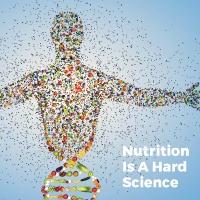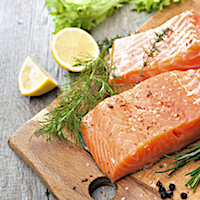Genes and Nutrition
Each of us is metabolically unique. Gene variations known as SNPs (single nucleotide polymorphisms) often are a factor in an individual’s ability to metabolize or use nutrients efficiently. Each of our specific nutrient needs is affected by which specific combination of SNPs we have, but with thousands known to impact nutrition metabolism, how do we know what those needs are?
NRI researchers are working to create a “catalog” of SNPs that alter our nutritional needs by understanding how genetic and other complex biological information can be used to better estimate individual nutrition requirements and intolerances. Our scientists use bioinformatics to extract such information from population and intervention studies, develop rules for predicting individual needs, and bring precision nutrition to health care providers and consumers with digital tools.
Publications
Genes and Nutrition Publications
2020
Genetic variants affecting bone mineral density and bone mineral content at multiple skeletal sites in Hispanic children. Voruganti VS
Precision (Personalized) Nutrition: Understanding Metabolic Heterogeneity. Zeisel S
2019
DNA methylation in mice is influenced by genetics as well as sex and life experience. French J
Cytosolic 10-formyltetrahydrofolate dehydrogenase regulates glycine metabolism in mouse liver. Krupenko S
Deleterious mutations in ALDH1L2 suggest a novel cause for neuro-ichthyotic syndrome. Krupenko S
Fine mapping and identification of serum urate loci in American Indians: The Strong Heart Family Study. Voruganti VS
Heterogeneity in Metabolic Responses to Dietary Fructose. Voruganti VS
Genetic analysis of hsCRP in American Indians: The Strong Heart Family Study. Voruganti VS
A trans-ancestral meta-analysis of genome-wide association studies reveals loci associated with childhood obesity. Voruganti VS
Healthy dietary patterns and risk and survival of breast cancer: a meta-analysis of cohort studies. Voruganti VS
Omega-3 Fatty Acids and Genome-Wide Interaction Analyses Reveal DPP10-Pulmonary Function Association. Voruganti VS
2018
C16-ceramide is a natural regulatory ligand of p53 in cellular stress response. Krupenko N
Nutritional Genomics of Cardiovascular Disease. Voruganti VS
Genetic determinants of BMI from early childhood to adolescence: the Santiago Longitudinal Study. Voruganti VS
Serum Lipid Concentrations and FADS Genetic Variants in Young Mexican College Students: The UP-AMIGOS Cohort Study. Voruganti VS
Arsenic-gene interactions and beta-cell function in the Strong Heart Family Study. Voruganti VS
Dietary Modulation of the Epigenome. Zeisel S
2017
Exome sequencing reveals novel genetic loci influencing obesity-related traits in Hispanic children. Voruganti VS
Genetic variation underlying renal uric acid excretion in Hispanic children: the Viva La Familia Study. Voruganti VS
Reduced brain volume and impaired memory in betaine homocysteine S-methyltransferase knockout mice. Zeisel S
Choline, Other Methyl-Donors and Epigenetics. Zeisel S
2016
CerS6 Is a Novel Transcriptional Target of p53 Protein Activated by Non-genotoxic Stress. Krupenko N
Genotype, B-vitamin status, and androgens affect spaceflight-induced ophthalmic changes. Zeisel S
Related News
Starving Cells May Lead to New Cancer Treatments
November 20, 2018 – Nutrient availability regulates cell metabolism, growth, and survival. When nutrients are in short supply, cells can pause their growth or even eliminate themselves through a process known as programmed cell death, thereby protecting the health of the organism as a whole. If nutrient deprivation happens at certain critical periods, such as during the rapid growth of the embryonic brain, severe developmental consequences can arise (this is why proper maternal nutrition is so important). In contrast, harnessing the innate ability of cells to enter programmed cell death is an important strategy in cancer treatment.
Nutrition Is a Hard Science
November 20, 2018 – There have been a lot of questions about the reliability of nutritional science. We should respond with an assertive statement: Nutrition is a hard science. By just about any comparison, much of what is known about nutrition and the methods that have built that knowledge is as robust as classical physics, biochemistry and other basic sciences generally recognized as rigorous.
Choline, Cognition and You: The Essential Nutrient for Maximum Brain Power
ESCONDIDO, Calif., June, 23, 2015 /PRNewswire/ -- Choline is critical to overall health and healthy cognitive function. This essential nutrient has an impact on the brain throughout our lives. Choline intake early in life supports the brain as it ages, preventing...
November Faculty Focus: Steven H. Zeisel, PhD
November 13, 2018 – From his lab in a textile mill-turned-food research center, a UNC scientist has brought an important nutrient to the world’s attention. Dr. Steven Zeisel wants to make sure you’re getting enough choline. In a state-of-the-art laboratory on the North Carolina Research Campus, in the unlikeliest of places in a former textile mill town, Zeisel is overseeing scientific experiments about a nutrient that could change the way we eat.
AFL@JWU Recipes – October 17, 2018
October 17, 2018 – Chef Megan Lambert, MS, RD, Senior Instructor in College of Culinary Arts at Johnson & Wales University, Charlotte, prepared healthy, delightful recipes with “Fun(ctional) Fall Flavors while Steph Saullo, MS, RD of the UNC Nutrition Research Institute, shared nutrition information on each recipe. The recipes from the October 17, 2018 Appetite For Life @ Johnson & Wales University program are available here for your cooking enjoyment!
AFL Program Summaries September 2018 – May 2019
Appetite For Life – Wednesday, September 19, with Delisha Stewart, PhD, Assistant Professor of Nutrition, UNC NRI: “Race, Ethnicity, and Health Disparities” Scientists at the Nutrition Research Institute are studying the role of genetics in health and wellness....






